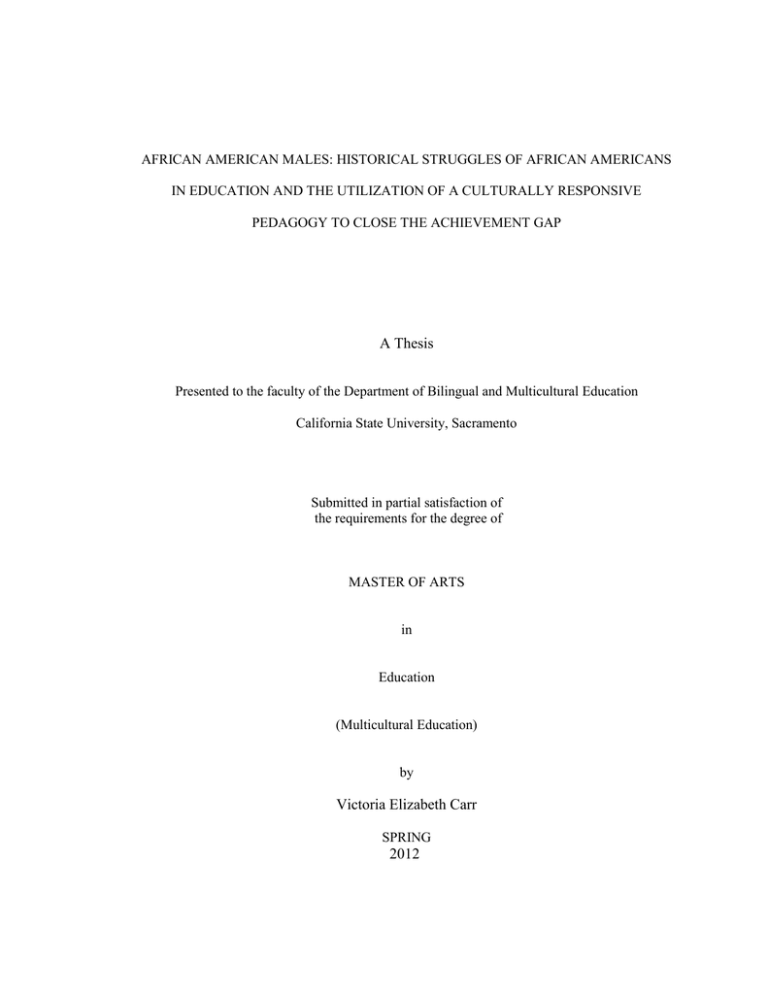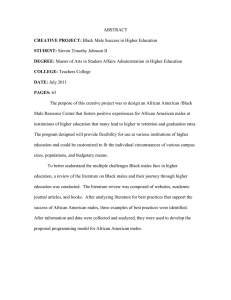
AFRICAN AMERICAN MALES: HISTORICAL STRUGGLES OF AFRICAN AMERICANS
IN EDUCATION AND THE UTILIZATION OF A CULTURALLY RESPONSIVE
PEDAGOGY TO CLOSE THE ACHIEVEMENT GAP
A Thesis
Presented to the faculty of the Department of Bilingual and Multicultural Education
California State University, Sacramento
Submitted in partial satisfaction of
the requirements for the degree of
MASTER OF ARTS
in
Education
(Multicultural Education)
by
Victoria Elizabeth Carr
SPRING
2012
© 2012
Victoria Elizabeth Carr
ALL RIGHTS RESERVED
AFRICAN AMERICAN MALES: HISTORICAL STRUGGLES OF AFRICAN AMERICANS
ii
IN EDUCATION AND THE UTILIZATION OF A CULTURALLY RESPONSIVE
PEDAGOGY TO CLOSE THE ACHIEVEMENT GAP
A Thesis
by
Victoria Elizabeth Carr
Approved by:
__________________________________, Committee Chair
Lisa William-White, Ph.D.
__________________________________, Second Reader
Forrest Davis, Ph.D.
____________________________
Date
iii
Student: Victoria Elizabeth Carr
I certify that this student has met the requirements for format contained in the University format
manual, and that this thesis is suitable for shelving in the Library and credit is to be awarded for
the thesis.
__________________________, Graduate Coordinator
Albert Lozano, Ph.D.
Department of Bilingual and Multicultural Education
Abstract
of
iv
___________________
Date
AFRICAN AMERICAN MALES: HISTORICAL STRUGGLES OF AFRICAN AMERICANS
IN EDUCATION AND THE UTILIZATION OF A CULTURALLY RESPONSIVE
PEDAGOGY TO CLOSE THE ACHIEVEMENT GAP
by
Victoria Elizabeth Carr
Statement of Problem - It is evident that there is a serious problem, beginning in
elementary school, with the lack of success for African-American males. In addition,
African-American males are not able to compete with their peers academically due to the
fact that many of them are not attending and/or graduating college. The question now,
and has been for a while is, how do we fix this? Hopefully through this study, a light will
be shown on possible causes for these disparities and potential solutions that could help
make a difference for the young African-American males currently attending school.
Sources of Data - This thesis is oriented towards conducting a survey of African
American males’ responses to education for the past five decades. The struggle for their
equality in education resulted in the acquisition of a vast amount of knowledge that can
be utilized to close the achievement gap in contemporary society.
Conclusions Reached - To help African American males succeed, the following things
need to be in place: the utilization of culturally responsive teaching in the classroom,
parent involvement, teachers must have high expectations, African American males need
positive role models, and teachers must know the students they are teaching.
_______________________, Committee Chair
Lisa William-White, Ph.D.
_______________________
Date
DEDICATION
I would like to dedicate my thesis to my two sons, Charles and Preston. I am
blessed to have two amazing children. Know that I always believe in you and love you
v
very much. You can do whatever you want, and know that mommy is always behind you,
supporting you and cheering you on. I am eagerly awaiting the day when I can read your
thesis! You are my motivation!
To the African American males in my current class and future classes, you can do
anything you put your mind to. Do not allow stereotypes to define you. Know that who
you are is amazing, and that you deserve success if you work hard. Lastly, know that you
have someone who believes in you.
ACKNOWLEDGEMENTS
First and foremost, I have to thank God. I am nothing and can achieve nothing
without Him. There is no way I would have made it this far in life, or been so blessed in
vi
life, had He not been watching over me. I am eternally grateful for everything He has
done. The fact that He loves me with all of my flaws makes me love Him even more. The
scripture in Jeremiah 29:11 says it beautifully, “For I know the plans I have for you,”
declares the Lord, “plans to prosper you and not to harm you, plans to give you hope and
a future.”
I want to thank the members of my church. I cannot say thank you enough for all
of the encouragement and prayers. I knew that whenever I was down and needed prayers
to get refocused, I could count on each one of you to pray for me. Many of you have been
there for me through every experience dealing with teaching and school, and I know it
was your prayers to our Heavenly Father that got me through the most difficult times. A
special thank you to the ladies in the women’s class. Your words of encouragement were
kept at the forefront of my mind as I worked. Thank you all for being you!
I would like to thank my family and friends who have been with me through this
process. It has taken me longer than I’ve wanted, but you never gave up on me. You gave
me the support and love that I needed, and it means so much. Even when I wanted to give
up, you encouraged me. Many of you were there to help with my first son, when I needed
to write, and I did not have to ask. Thank you all so much, and I love you.
I would like to thank the mujeres from the BMED cohort. We started in Fall 2009,
and finally the remainder of us are graduating. The time in class with all of you, has been
amazing. I learned so much from each one of you. It was nice to know we all went
through this together, even if some of us took a bit longer. A special thank you to Lisa,
vii
Linda, Gretchen and Jennifer. You women continued to encourage me and support me
every time I wanted to give up and quit. Thank you mujeres.
I would like to thank my advisor, Dr. Lisa William-White. Thank you for
continuing to work with me, even though I took longer than planned. Thank you for
believing in this project and helping me to add my thoughts to the current scholarship on
African American males. Thank you to Dr. Forrest Davis for helping me finally reach the
end. I know that I would not have completed this thesis had you not helped me, and for
that, I am grateful.
Thank you to the male subjects who agreed to be a part of my thesis. Your
information and further recommendations to help future African Americans, was more
than helpful. All of you have helped to make a difference. Thank you.
Thank you to my husband, Timothy B. Mitchell. Most importantly, I would like
to thank you for being the father of my two beautiful children. You have been there with
me through most of my educational endeavors, and you have been encouraging and
supportive. Thank you for taking on most things, due to me spending most of my time
writing. I am glad I have someone who cares and supports me achieving my dreams. You
pushed me when I wanted to give up. Thank you and I love you!
A special thank you to my Nana. You made it so that I could get to this point. You
worked an extra year to help me pay for school. You have encouraged me and pushed me
the whole time. Thank you for helping with your great-grandson so that I could go to
school. I will never forget all you have done to help me reach my goals. You helped to
make this dream come true for me. Thank you so much Nana. I love you!
viii
My final, and most important thank you, goes to an amazing woman, my mother.
I would not have made it here today without all of your love, help, support, and
encouragement. You helped to keep me focused, even when I wanted to give up. Every
time I was down and wanted to cry, you were the one there to pick me up. I will never be
able to say thank you for everything you have ever done, and I know you will continue to
do. You have been there through everything in my life, whether good or bad, and you
have proudly stood by me. I am blessed to have you as a mother and the Nana of my
children. You have been the one person to always by my side and on my side. You have
an amazing heart. I appreciate you and I love you! I know I have said thank you a million
times, but it still is not enough. Thank you mom!
TABLE OF CONTENTS
Page
ix
Dedication………………………………………………………………………………………....vi
Acknowledgments………………………………………………………………………………..vii
List of Tables ................................................................................................................................ xii
Chapter
1. INTRODUCTION .......................……………………………………………………………..1
Background .........................................................................................................................1
Statement of the Problem ................................................................................................... 7
Theoretical Framework ..................................................................................................... 9
Limitations of the Study………………………………………………………………….11
Definition of Terms ...........................................................................................................15
Significance of Study ........................................................................................................16
Organization of the Remainder of the Study ................................................................... 18
2. REVIEW OF RELATED LITERATURE ................................................................. ... ........ 19
Historical Context of African American Oppression ................................................. .... 21
A Look at African American Male Achievement through the Decades ...........................24
Critical Race Theory .........................................................................................................39
Culturally Responsive/Relevant Teaching ........................................................................42
Cultural, Racial, and Academic Identity Development ................................................... 48
3.
METHODOLOGY................................................................................................................ 55
Research Questions .......................................................................................................... 55
Population ........................................................................................................................ 55
Data Collection ................................................................................................................ 56
Analyzing Data ................................................................................................................ 60
Research Design ............................................................................................................... 62
The Researcher’s Positionality ........................................................................................ 65
4.
ANALYSIS OF DATA ........................................................................................................ 72
Results .............................................................................................................................. 73
Life History Interview Results ..........................................................................................81
Discussion ........................................................................................................................ 90
5.
SUMMARY, CONCLUSIONS, AND RECOMMENDATIONS ..................................... 95
x
Summary .......................................................................................................................... 95
Conclusions .......................................................................................................................95
Recommendations ............................................................................................................ 96
Appendix A. Consent Form .................................................................................................... 107
Appendix B. Survey ................................................................................................................ 109
Appendix C. Life History Interview Questions ........................................................................ 111
References ................................................................................................................................... 112
LIST OF TABLES
Tables
Page
1. Table 1: Achievement Gap Between African-Americans and Whites...................... 2
2. Table 2: Achievement Gap for Grade 4 and Grade 8...............................................20
3. Table 3: CST Scores for Language Arts...................................................................57
xi
xii




